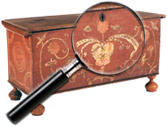|
|
The Ralph Raby Collection
Ralph Raby is a direct descendant of the Chicago retail shoe magnates George and Joseph Bullock. The Bullocks were typical upper-class Victorians, with a sophisticated eye for fine furniture, art and decorations who traveled extensively throughout Europe. The majority of the Raby collection was assembled by the brothers and their wives in the 1870′s and 1880′s.
Their travels and philosophy were described by Mr. Raby for a 1984 Chicago Tribune [...] Click here to continue reading.
LeCoultre Music Box Instruments
Credit for inventing the cylinder music box, circa 1790, is usually given to David LeCoultre, of Brassus, Switzerland. His descendent Francois Charles LeCoultre (1801 to 1850), also a maternal nephew of Isaac Daniel Piquet, founded his company in 1828. He was succeeded by his son, Charles Francois LeCoultre in 1865, who ran it until circa 1871, when it became Perrelet & Co.
Notes on Mechanical Features of Music Boxes
Feather Dampers: Music boxes generally have dampers to prevent a harsh grating sound from being heard as the cylinder pins strike the same vibrating tooth in rapid succession. Basically, most, but not all, of the early pieces had either no dampers or feather dampers, though some of the best early pieces had steel dampers arranged in some unusual ways.
Tooth or Teeth: One of the most basic [...] Click here to continue reading.
Cuff Music Boxes
Cuff music boxes were designed and developed by Ferdinand Otto of the F. G. Otto & Sons Co. of New Jersey circa 1894 and sold under the Capital brand name. They were called cuff music boxes because of the shape of their music cylinders which resembles a gentleman’s shirt cuff. The cylinders were designed and developed by Patrick Kennedy of Brooklyn , New York , a machinist and designer for the [...] Click here to continue reading.
Stella Music Boxes
Stellas were the swan song for the Mermod Freres company of Ste. Croix, Switzerland. They were vastly over-engineered which led to extremely high production costs. This ultimately led to bankruptcy for Mermod; they could not compete profitably in a market dominated by Symphonion, Polyphon, and Regina, all of whom could produce comparably sized boxes at much lower cost, most of which were musically superior to the Stella product. Stellas do have [...] Click here to continue reading.
|
Recent Articles
- Charles Alfred Meurer – American Artist & Tromp L’Oeil Artist
- Sendak, Maurice – American Artist & Writer
- Godie, Lee – American Artist
- Davis, Vestie – American Artist
- Bartlett, Morton – American Artist
- Mackintosh, Dwight – American Artist
- Evans, Minnie Jones – African-American Artist
- Mumma, Ed (Mr. Eddy) – American Artist
- Nice, Don – American Artist
- Savitsky, John (Jack) – American Artist
- Gordon, Harold Theodore (Ted) – American Artist
- Dial, Thornton – African-American Artist
- Doyle Sam – American Artist
- Johnson, Lester Frederick – American Artist
- Finster, Howard – American Artist
|
|
